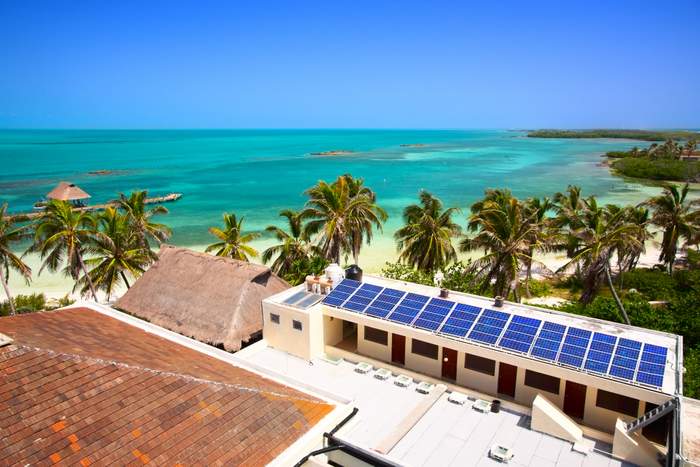By Chris Cadwell, WRB Energy, VP Renewable Energy
Solar PV wholesale energy pricing is continuing to drop below two cents per kWh in the U.S., Latin America, and other regions. In the U.S., the sub-two cents/kWh solar price is a watershed moment because solar plus storage is now the cheapest energy source available today. It is truly a paradigm shift when solar plus storage is less expensive than natural gas in an oversupplied gas market.
I speak with utility executives from Caribbean nations frequently—many with aggressive renewable energy goals. First, they ask me if these new price levels are real and achievable for long-term power purchase agreements. And second, they ask a line of questions about how the price for renewable energy on islands can reach the same level.
First, yes, these recently reported numbers in the U.S. and Latin America, including those in California, Nevada, the Midwest, and Mexico, are real. And, yes they are bankable because:
- The renewable projects are massive plants at utility gigawatt (GW) scale.
- Investment tax credits (ITC) in the U.S. and other subsidies are available to reduce costs.
- Renewables in the U.S. are sufficiently de-risked to the point where equity owners view the investment the same as a medium-risk bond. I like to say that they are seeking “micro-yields.”
To answer the second question, it’s important to acknowledge that renewable energy prices are decreasing in the Caribbean just as everywhere else due to the lower cost of equipment. However, island pricing won’t ever match exactly. Some examples of issues that drive energy prices above the mainland counterparts include:
- Costs to develop per MW multiply when amortizing higher development costs due to lack of economies of scale in each market—MW versus GW. Each market is unique from a legal, tax, permitting, and cultural perspective.
- Islands with unique ports, terrain, and roadways, incur higher import and transportation costs for solar equipment.
- Additionally, the push for increased resiliency in the Caribbean can boost higher hurricane/disaster insurance costs, which further increases the risk of realizing reasonable equity returns for investors.
So, what is the silver lining?
Currently in the Caribbean, the thermal generation is at a higher energy price than in the U.S. and Latin America because natural gas, oil, or other fuel is imported from one or a few suppliers. So, despite higher renewable project costs, the fossil fuel price can be beaten with appropriate renewable project planning, development, and competitive solar and energy storage pricing.
In WRB Energy’s experience with power purchase agreements (PPAs) in the region, Caribbean utilities can successfully manage and work through the issues to develop and deliver renewable energy projects on schedule at a competitive price. Solar investment and development decisions can be tied specifically to the characteristics of the nation and available sites using the appropriate technology to balance and optimize efficiency and cost.
Utilities can do their part as well to help further mitigate risk when comparing and selecting solar PV bids. It’s essential to look not only at the bottom-line price but the developer’s track record in completing projects within the contracted timeframe. Credible developers need credible markets to participate in for long-term success.
Without question, solar energy is the least-cost source of power today and will get less expensive as the technology advances and the cost for equipment continues to decrease. Energy storage is following close behind.
Many of us in the energy industry are contemplating how monumental these pricing shifts are for a sustainable renewable energy future. The impacts will change how we live and operate for decades to come. The same is now true in the Caribbean even though the metrics are different.
Chris Cadwell has extensive utility-scale project development experience as part of the WRB Energy team. His focus is on power marketing, development management, and M&A.
— Solar Builder magazine


Leave a Reply
You must be logged in to post a comment.